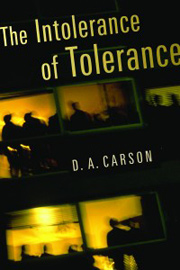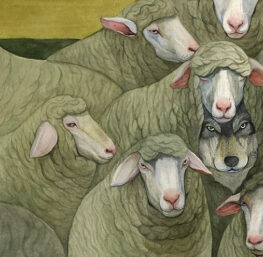 by Don Carson –
by Don Carson –
The notion of tolerance is changing, and with the new definitions the shape of tolerance itself has changed. Although a few things can be said in favor of the newer definition, the sad reality is that this new, contemporary tolerance is intrinsically intolerant. It is blind to its own shortcomings because it erroneously thinks it holds the moral high ground; it cannot be questioned because it has become part of the West’s plausibility structure. Worse, this new tolerance is socially dangerous and is certainly intellectually debilitating. Even the good that it wishes to achieve is better accomplished in other ways.
Let’s begin with dictionaries. In the Oxford English Dictionary, the first meaning of the verb “to tolerate” is “To respect (others’ beliefs, practices, etc.) without necessarily agreeing or sympathizing. 3. to put up with; to bear; as, he tolerates his brother-in-law. 4. in medicine, to have tolerance for (a specified drug, etc.).” Even the computer-based dictionary Encarta includes in its list “ACCEPT EXISTENCE OF DIFFERENT VIEWS to recognize other people’s right to have different beliefs or practices without an attempt to suppress them.” So far so good: all these definitions are on the same page. When we turn to Encarta’s treatment of the corresponding noun “tolerance,” however, a subtle change appears: “1. ACCEPTANCE OF DIFFERENT VIEWS the accepting of the differing views of other people, e.g., in religious or political matters, and fairness toward the people who hold these different views.”
This shift from “accepting the existence of different views” to “acceptance of different views,” from recognizing other people’s right to have different beliefs or practices to accepting the differing views of other people, is subtle in form, but massive in substance. To accept that a different or opposing position exists and deserves the right to exist is one thing; to accept the position itself means that one is no longer opposing it. The new tolerance suggests that actually accepting another’s position means believing that position to be true, or at least as true as your own. We move from allowing the free expression of contrary opinions to the acceptance of all opinions; we leap from permitting the articulation of beliefs and claims with which we do not agree to asserting that all beliefs and claims are equally valid. Thus we slide from the old tolerance to the new.
contemporary tolerance is intrinsically intolerant. It is blind to its own shortcomings because it erroneously thinks it holds the moral high ground; it cannot be questioned because it has become part of the West’s plausibility structure.
Which Tolerance?
The problem of what “tolerance” means is in fact more difficult than these few comments on dictionary entries might suggest. For in contemporary usage, both meanings continue in popular use, and often it is unclear what the speaker or writer means. For instance, “She is a very tolerant person”: does this mean she gladly puts up with a lot of opinions with which she disagrees, or that she thinks all opinions are equally valid? A Muslim cleric says, “We do not tolerate other religions”: does this mean that, according to this cleric, Muslims do not think that other religions should be permitted to exist, or that Muslims cannot agree that other religions are as valid as Islam?
A Christian pastor declares, “Christians gladly tolerate other religions”: does this mean, according to the pastor, that Christians gladly insist that other religions have as much right to exist as Christianity does, or that Christians gladly assert that all religions are equally valid? “You Christians are so intolerant,” someone asserts: does this mean that Christians wish all positions contrary to their own were extirpated, or that Christians insist that Jesus is the only way to God? The former is patently untrue; the latter is certainly true (at least, if Christians are trying to be faithful to the Bible): Christians do think that Jesus is the only way to God. But does that make them intolerant? In the former sense of “intolerant,” not at all; the fact remains, however, that any sort of exclusive truth claim is widely viewed as a sign of gross intolerance. But the latter depends absolutely on the second meaning of “tolerance.”
Other distinctions can be usefully introduced. Go back to the assertion “Christians gladly tolerate other religions.” Let us assume for a moment that the first meaning of “tolerate” is in view—i.e., Christians gladly insist that other religions have as much right to exist as their own, however much those same Christians may think the other religions are deeply mistaken in some respects. Even this more classical understanding of “tolerate” and “tolerance” leaves room for a certain amount of vagueness. Does the statement envisage legal tolerance? In that case, it is affirming that Christians gladly fight for the equal standing before the law of all religious minorities. Of course, from a Christian perspective, this is a temporary arrangement that lasts only until Christ returns. It is a way of saying that in this fallen and broken world order, in this time of massive idolatry, in this age of theological and religious confusion, God has so ordered things that conflict, idolatry, confrontation, and wildly disparate systems of thought, even about God himself, persist. In the new heaven and the new earth, God’s desires will not be contested but will be the object of worshiping delight.
Christians do think that Jesus is the only way to God. But does that make them intolerant?
For the time being, however, Caesar (read: government) has the responsibility to preserve social order in a chaotic world. Although Caesar remains under God’s providential sovereignty, nevertheless there is a difference between God and Caesar—and Jesus himself has told us to render to Caesar what is Caesar’s and to God what is God’s. It will not be like that in the new heaven and the new earth. Thus even this legal tolerance, which Christians should surely defend, belongs to the present, to the time when the kingdom of God has dawned but has not yet been consummated, or (to say it the way theologians do) to this age of inaugurated but not yet final eschatology.
Nurtured and Cultivated
Of course, in the right context the same sentence, “Christians gladly tolerate other religions,” might suggest, not legal tolerance, but social tolerance: that is, in a multicultural society, people of different religions should mix together without slights and condescension, for all people have been made in the image of God and all will give an account to him on the last day. Of all people, Christians ought to know that they are not one whit socially superior to others. They talk about a great Savior, but they are not to think of themselves as a great people. So social tolerance should be encouraged.
Yet another distinction demands brief mention. Someone might assert that the God of the Bible, even under the terms of the new covenant, does not hold up tolerance as a virtue: if men and women do not repent and by conversion come under the lordship of Christ, they perish. Certainly the God of the Bible does not hold up tolerance in the second sense as a virtue. Yet is not God’s patience and forbearance in delaying Christ’s return a form of tolerance, intended to lead people to repentance (Romans 2:4)?
Hence the distinction: bad ideas and bad actions are tolerated (in the first sense), reluctantly and with bold articulation of what makes them bad, while the people who hold those bad ideas or perform those bad actions are tolerated (again, in the first sense) without any sense of begrudging reluctance, but in the hope that they will come to repentance and faith. Tolerance toward persons, in this sense, is surely a great virtue to be nurtured and cultivated.



